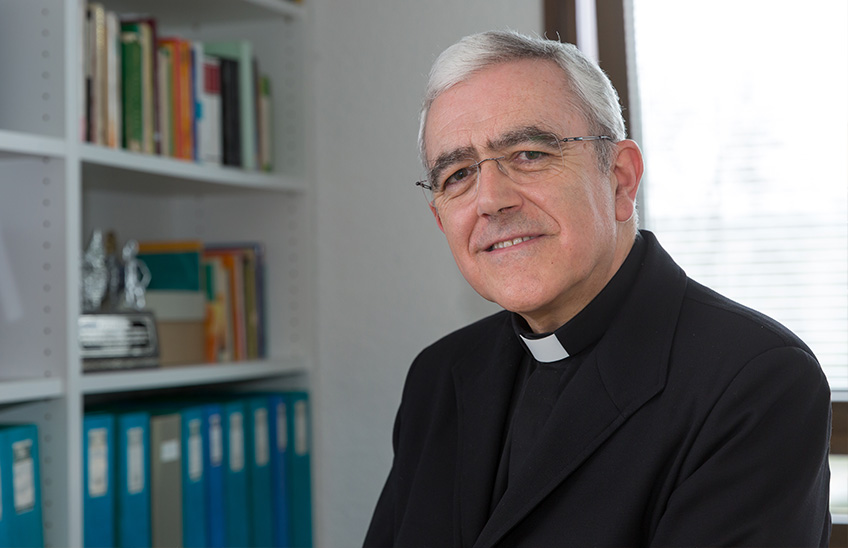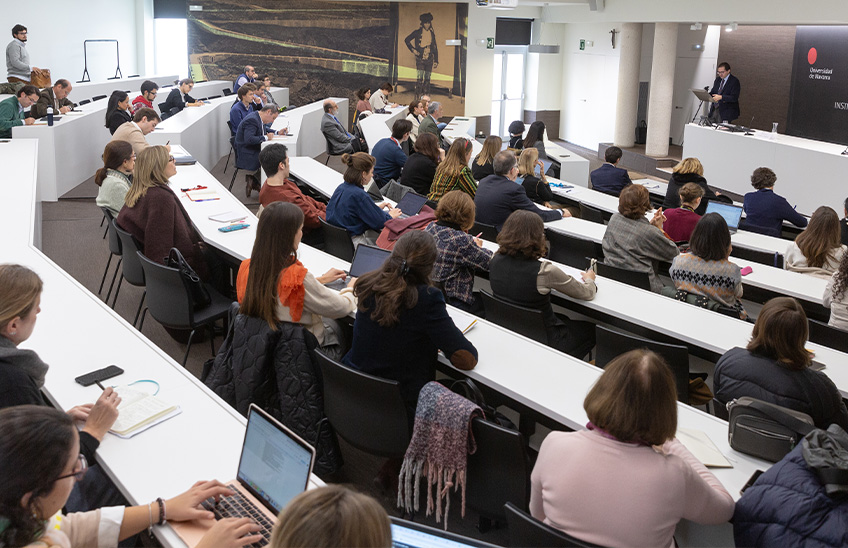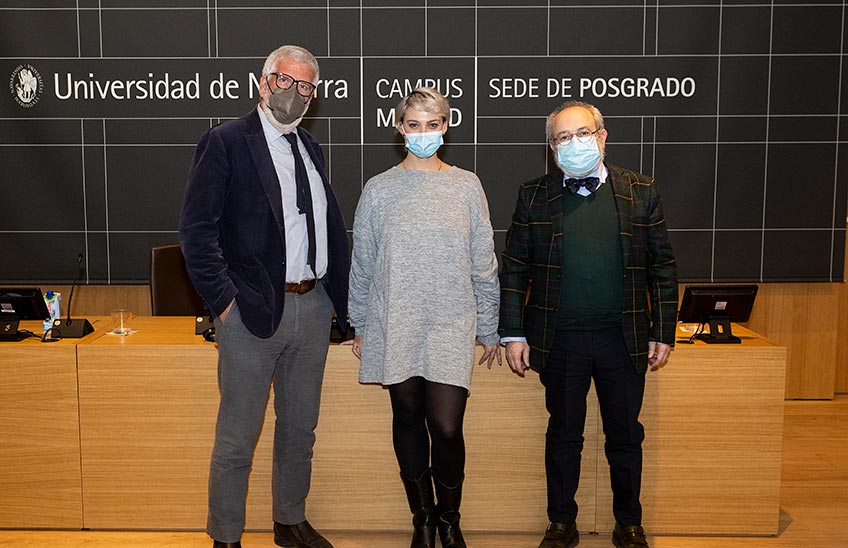The University's Core Curriculum presented in a panel of the congress 'The Church in the Education' of the lecture Spanish Episcopal Conference.
The intervention of Professor Ramiro Pellitero, from the School of Theology, is part of a space destined to experiences of Catholic universities and university centers of Christian statement of core values .

PhotoManuelCastells/Ramiro Pellitero, professor at School of Theology.
28 | 02 | 2024
The project of the Institute Core Curriculum was chosen as one of the "good practices" for a panel at the congress 'The Church in the Education' organized by the Spanish Episcopallecture and that has been developed in several stages, between October 2023 until last February 24 in Madrid, the closing day.
Five people from the University were present: Beatriz Castillo, deputy director of the Institute Core Curriculum; Ignacio Salcines, Deputy Director of the Belagua Torre II; Sonia Rivas and Álvaro José Balaguer, professors of y Letras; and Ramiro Pellitero, professor of high school Mayor Belagua Torre II; Sonia Rivas and Álvaro José Balaguer, professors of the School of Philosophy y Letras; and Ramiro Pellitero, professor of the School of Theology of the University.
Professor Ramiro Pellitero represented the University as a panelist on October 16 in Granada, a previous meeting in which experiences of Catholic universities and university centers of statement of core values Christian were collected. His intervention could be followed online through this link. link.
Here is more information about congress and the panel in which he participated:
What was the purpose of this congress?
On the one hand, it sought to renew the presence and commitment of the Church and Catholics to Education. At the same time, it was a space for reflection and exchange of experiences and good practices in this field. In this way we were able to rediscover our contribution to the common good and identify current challenges.
Where did the idea come from?
It is a response to the educational Global Pact initiative , presented by Pope Francis in 2019. It also has to do with the instruction of the Dicastery for Catholic Education entitled 'The Identity of the Catholic School for a Culture of Dialogue' (2022). It is understood that it is not only about officially Catholic schools, but encompasses educational institutions of Catholic inspiration. It takes into account international initiatives to renew educational approaches and the new laws of Education in countries such as ours, aimed at promoting an inclusive and equitable quality Education .
In your panel you put the focus on the University's Institute Core Curriculum . Why not on other aspects?
When we were asked by the Episcopal lecture to present how the Christian identity is manifested in the statement of core values of the University of Navarra at the level of educational, we gathered various experiences (besides the Institute, others from the Chaplaincy, including specifically that of , the Higher Institute of Religious Sciences, Tantaka (the solidarity time bank), the student , etc.). Core CurriculumWe have also gathered other experiences from the Chaplaincy, including specifically that of the Clínica Universidad de Navarra, from the Higher Institute of Religious Sciences, from Tantaka (the solidarity time bank), from the area of students, etc. As we had already been told, for the congress we would choose only some of them, since there are hundreds of experiences and good practices in this field all over the country.
Finally, the organizers chose, as a particularly significant experience of the University of Navarra, the project of the Institute Core Curriculum, I think because of its incisiveness, good organization and consolidation. Of course, the other contributions, many, that we make in relation to the Christian inspiration of the Education are taken into account and are welcome.
In fact, the experiences gathered in the congress were grouped into 9 blocks: statement of core values Christian statement of core values schools (religious, lay, diocesan); Catholic Religion faculty ; Christian faculty in the various teaching centers; Special Education centers; Professional training centers; Catholic universities and university centers of statement of core values Christian statement of core values ; senior high schools and university residences; non-formal Education , volunteer activities, free time and other cultural projects; parish-family-school.
Could you give us a few hints of your intervention?
I explained what the Core Curriculum is, how it is structured (by means of transversal subjects that deal with the great questions of human existence), its objectives (in relation to intellectual maturity, the interpretation of reality, the meaning of life, integration with the rest of the subjects, the cultivation of aesthetic and moral sensibility) and its double pathway (in ordinary mode or from the reading of "great books" of thought, literature and history).
To whom was this congress addressed?
It was addressed to the general public, as information on the contribution of Christians to the Education (either officially or institutionally, or in other ways, individual or associative). sample Also to Christians, to let them know what we are doing together to collaborate with the common good of citizens inside and outside the country, at a time when an "integralEducation " is decisive to reach a truly human progress, overcoming cultural and social barriers, wars and other conflicts.
What does evaluation make of congress?
team member As a driving force of universities and university centers of Catholic identity and as a panelist, my work was very interesting. As for the whole congress, I would point out the importance of having managed to organize the more than 1,200 participants, to speak only of those who attended the concluding day, and who were able to count on the materials that had been collected during the four months of work prior.
I would emphasize that the congress did not want to indicate any direction for the work educational , but first of all to gather good experiences of what is being done throughout the country. Secondly, what was intended was to note the challenges, strengths and opportunities that are detected in our work.
Thus, as has been said, congress is not simply a point of arrival, of meeting and celebration, of synthesis and awareness of what we are doing, trying to respond to the trust that so many people place in us, and which leads us to thank everyone for their daily work ; but also a starting point to continue facing these challenges, which are many, in this change of era.
The congress has a web page, where experience and reflections have been shared , and where the Documents framework of each sector are collected, with the challenges detected and other provisional conclusions: Towardscongress2024.educacionyculturacee.es




